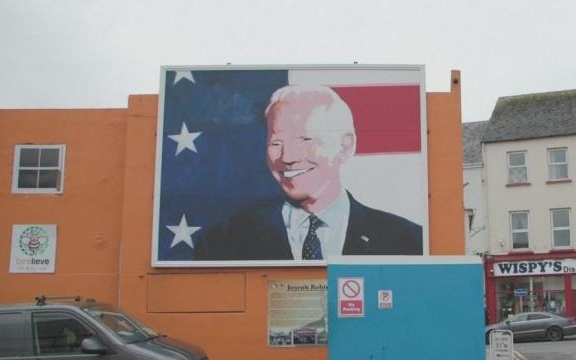A tribute to Joe Biden in his ancestral town of Ballina, Ireland after he was elected US President (Peter Morrison/AP)
UPDATE 1913 GMT:
I chatted further with Monocle Radio’s Andrew Mueller on Tuesday afternoon about Joe Biden’s four-day visit to the Irish island and the state of US-Ireland-UK relations.
Listen to Discussion from 1:40:
I discuss the significance of Biden’s trip for Northern Ireland’s politics, with the Assembly and Executive suspended since May 2022 because of a boycott by the Democratic Unionist Party.
I consider the Biden Administration’s view of the UK’s Sunak Government — “a lot more reliable than its predecessor under Boris Johnson”.
To Ireland to consider the response — “massive” for the second visit by a US Irish Catholic President and for its ascending position with Washington, in contrast to the turmoil of Brexit Britain.
And then to the US to assess if Biden will get a boost for his 2024 Presidential campaign from the journey.
UPDATE, APRIL 11:
EA’s Liam Kennedy provides the closing analysis in The New York Times’ overview of Joe Biden’s trip to Northern Ireland and the Republic of Ireland.
Ireland and the Good Friday Agreement are viewed as a success for US foreign policy, and that’s why people on both sides of the aisle can buy into it.
There are very few things left in Washington that are seen as bipartisan, and it’s no mean thing to be able to say that Ireland is one of them.
However, he cautions, “Biden is the second Irish Catholic president of the U.S., but where is the next one coming from? He could be the last hurrah of Irish American liberalism.”
More than 30 million people in the United States still claim Irish ancestry: “That surely means something. But what?”
ORIGINAL ENTRY, APRIL 10: I joined Times Radio’s Carole Walker on Sunday to discuss US President Joe Biden’s trip this week to Northern Ireland and the Republic of Ireland.
I begin with the significance of the 1998 Good Friday Agreement, after decades of violence in Northern Ireland, and its continued importance.
This showed what could be done when groups come together with a will to finally avoid confrontation.
But this is still a moment of great delicacy, given the instability caused by Brexit, and in particular the Northern Ireland Protocol.
I discuss the firm US position in support of the Northern Ireland Protocol, the provision in the Brexit Agreement preventing the return of a “hard border” between Northern Ireland and the Republic.<
See also Biden’s Diplomatic Mission In Ireland
Then I look at the post-Brexit position of the US, Ireland, and the UK: as US-Irish relations build, London risks being on the outside with the economic damage and self-imposed isolation of its withdrawal from the European Union.
We are past the moment when UK politicians can invoke the “special relationship”.
The Americans have let it be known that we are in a post-Brexit world where they see Ireland as important, both for the US-Ireland relationship and as a bridge to the European Union.
The UK is now outside that relationship.
See also Brexit’s Broken Britain and the Northern Ireland Protocol

